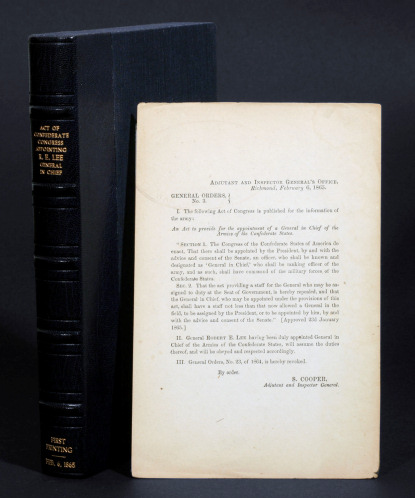|
ROBERT E. LEE
APPOINTED "GENERAL IN CHIEF"
 [LEE,
ROBERT E.]. [LEE,
ROBERT E.].
An Act to provide the appointment of a General in
Chief of the Armies of the Confederate States. General Orders No. 3;
Richmond, February 6, 1865"Deeply
impressed the the difficulties and responsibilities of the position, and
humbly invoking the guidance of the Almighty God, I rely for success
upon the courage and firmness of the people, confident that their united
efforts under the blessing of Heaven will secure peace and
independence." —R. E. Lee upon being appointed General-In-Chief
"Providence raises up the man for the time, and a man for this occasion,
we believe, has been raised up in Robert E. Lee, the Washington of the
second American Revolution." —The Richmond Dispatch, February 7, 1865
"Public demand led to [Lee’s] reluctant acceptance of an appointment as
general-in-chief. The Confederate Congress and Virginia Legislature
adopted resolutions asking for Lee’s appointment, but Lee told the
president that he did not want the job. Davis was hard pressed to
sustain his administration, though, and wanted to share responsibility.
On February 9, Lee accepted a rank similar to that bestowed upon
Washington."
—Richard B. McCaslin, Lee in the Shadow of Washington
OFFICIAL BROADSIDE CONFEDERATE PRINTING with seal on top left corner
appointing Robert E. Lee "General in Chief" of the Confederate forces.
By 1865 Jefferson Davis had lost widespread support throughout the
South. As the Confederacy’s fortunes worsened, there was a growing sense
that Davis lacked the political and, in his capacity as
Commander-in-Chief, the military skills needed to deliver victory and
independence from the Union. Davis’s increasingly restive detractors
began looking for ways to diminish the president’s role and expand that
of their great general, Robert E. Lee. Early proposals for expanding
Lee’s authority included the idea of simply making him
Commander-in-Chief and thus de facto leader of the Confederacy. This
never came to pass, in large part because Lee himself made it clear that
he had no wish to encroach upon Davis’s authority. Despite this there
was a widespread desire among the public, as reflected in this Act of
the Confederate Congress, for Lee’s role to be expanded and Davis’s
diminished. This Act gave formal expression to this important shift in
the Confederate South. A highly important piece of Confederate
legislation, these orders not only represent the culmination of Robert
E. Lee's career, but had significant effects on the outcome of the war.
After Lee was appointed "General in Chief" he became, like Washington
for the North, the central figure in which the Confederates placed their
hopes. Consequently, when Lee surrendered to Grant, the implications
were profound. "Without their Washington, Southerner’s realized their
revolution was over" (McCaslin, 191).
General Orders No. 3; Richmond, February 6, 1865. Housed in custom
half-leather box. In remarkable condition for such a fragile item, with
small tear visible on verso and only very light browning. Scarce:
Printed for and distributed to members of the Confederate Congress and
military officers and officials. $8000.
|